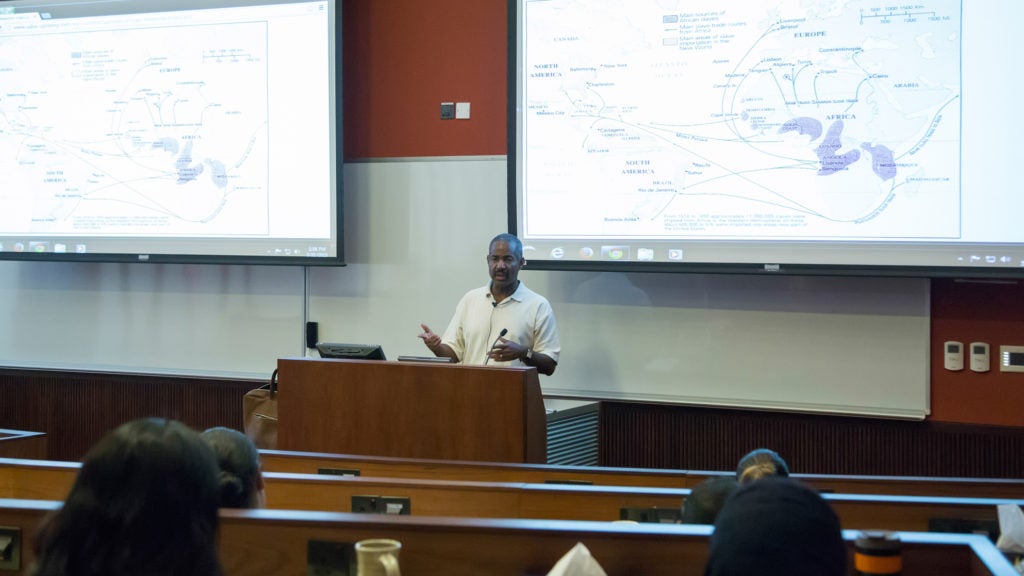GU-Q Hosts Dr. Michael Gomez Lecture on the Topic of African Experience in the Americas

Dr. Michael A. Gomez who is a professor of History and Middle Eastern and Islamic Studies at New York University, recently was hosted by Georgetown University in Qatar (GU-Q) where he held a lecture titled The African Experience in the Americas: Possible Implications for the Indian Ocean.
A cultural and social historian of both Africa and its diaspora, Dr. Gomez in his lecture presented on the subject of relationship between African diaspora as it has developed in the Americas. The lecture addressed African diasporic streams, mostly concentrating on the one that is most widely studied today and is associated with the Atlantic trade in African slaves. This trade, which began in earnest in the 15th century, may have delivered as many as 200,000 Africans to various European societies and 11 to 12 million to the Americas over time. The fifth major stream which began during the 19th century particularly after slavery’s demise in the Americas which is characterized by the movement of Africans and peoples of African descent among, and their resettlement in, various societies.
Dr. Gomez has served as the director of the Association for the Study of the Worldwide African Diaspora (ASWAD) from its inception in 2000 to 2007. He has also served as chair of the History departments at both NYU and Spelman College, and served as President of UNESCO’s International Scientific Committee for the Slave Route Project from 2009 to 2011. His first book, Pragmatism in the Age of Jihad: The Precolonial State of Bundu (Cambridge University Press, 1992), examines a Muslim polity in what is now eastern Senegal. The next publication, Exchanging Our Country Marks: The Transformation of African Identities in the Colonial and Antebellum South (University of North Carolina Press, 1998), is concerned with questions of culture and race as they were informed by the African presence and experience. Reversing Sail: A History of the African Diaspora (Cambridge University Press, 2005) is primarily aimed at an undergraduate audience, and is more fully involved with the idea of an African diaspora, as is Diasporic Africa: A Reader (New York University Press, 2006), an edited volume that spans time and space in investigating a variety of themes and issues. Black Crescent: African Muslims in the Americas (Cambridge University Press, 2005, Black Caucus of the American Library Association 2006 Literary Awards Winner for Nonfiction Category), continues with the study of the African diaspora by looking at the ways in which African Muslims negotiated their bondage and freedom throughout the Americas, but in a way that allows for significant integration of Islamic Africa. Primarily a cultural and social historian of both Africa and its diaspora, Gomez is currently in the writing stages of a book on the history of early and medieval West Africa, with a focus on imperial Songhay. Upon its completion, he plans to write a comprehensive study of the African diaspora, within which he will address all attendant arguments and debates. Throughout, he will remain connected to the Arabic manuscript project underway in Mali, arguably one of the most important endeavors to develop in the twentieth and twenty-first centuries. He continues to work with these as well as other organizations invested in the struggles of people of African descent worldwide, and especially looks forward to exciting opportunities developing in Latin America.